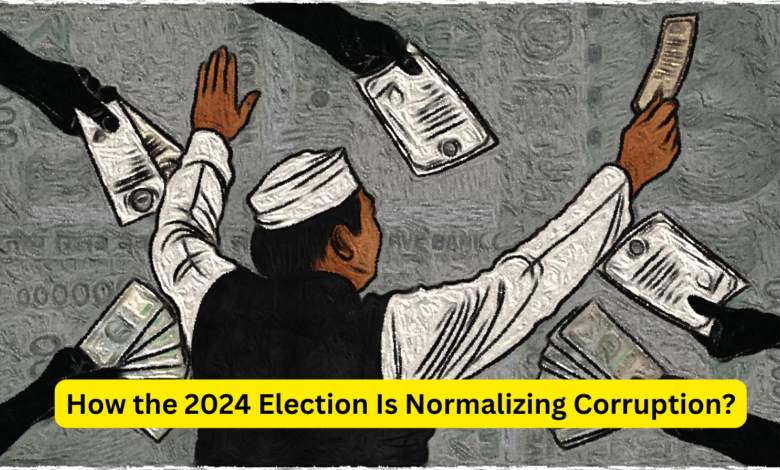How the 2024 Election Is Normalizing Corruption?

How the 2024 Election Is Normalizing Corruption? The 2024 U.S. presidential election is shaping up to be one of the most contentious and revealing in recent history. As political scandals continue to dominate headlines, the normalization of corruption is becoming increasingly apparent. This article explores how the 2024 election is playing a pivotal role in normalizing corruption and what this means for the future of American democracy.
Understanding the Normalization of Corruption
In recent years, the term “normalization of corruption” has increasingly entered the political lexicon. This phenomenon refers to the process by which corrupt practices become so prevalent and accepted that they no longer shock or outrage the public. Instead, they become a regular part of the political landscape. The 2024 election is a prime example of this troubling trend.
The Role of High-Profile Scandals
High-profile scandals involving prominent figures, including former President Donald Trump and current Vice President Kamala Harris, have exposed the extent to which corruption has become normalized in American politics. The recent revelations of unethical behavior and questionable legal maneuvers have shifted public perception. Instead of seeing these scandals as aberrations, many now view them as a standard aspect of political life.
Donald Trump’s Legal Troubles
Donald Trump’s ongoing legal battles illustrate the erosion of traditional norms around political conduct. From allegations of fraud to accusations of obstruction, Trump’s legal issues have sparked heated debates about accountability and justice. Yet, despite the seriousness of these allegations, Trump’s position in the political arena remains influential. This resilience in the face of scandal exemplifies how corruption is increasingly seen as part of the political process rather than a serious offense.
Kamala Harris and the Supreme Court Controversies
Vice President Kamala Harris has also been embroiled in controversies, particularly concerning her stance on the Supreme Court and judicial appointments. Critics argue that Harris’s political maneuvers are part of a broader strategy to consolidate power, raising questions about the integrity of the political system. The way these controversies are handled—often with minimal repercussions—further normalizes the idea that such behavior is acceptable in contemporary politics.
The Impact on Public Perception
The normalization of corruption has a profound impact on public perception and trust in government institutions. When scandals become routine, they diminish the sense of outrage and the demand for accountability. This shift in attitude can lead to a more cynical view of politics, where voters may come to accept corrupt practices as an inevitable part of the system.
Erosion of Trust
One of the most significant consequences of normalizing corruption is the erosion of trust in government. As political scandals become more common, the public’s faith in elected officials and institutions diminishes. This distrust can undermine democratic processes and weaken the overall effectiveness of governance.
Increased Cynicism
When corruption is seen as normal, it fosters a climate of cynicism among voters. People may become disillusioned with the political system, believing that no matter who is in power, corruption will prevail. This sense of futility can decrease voter engagement and participation, further entrenching the corrupt practices that are being normalized.
The Media’s Role in Shaping Perceptions
The media plays a crucial role in shaping public perceptions of corruption. How scandals are reported, the tone of the coverage, and the prominence given to different issues all influence how the public perceives corruption.
Sensationalism vs. Substance
Media outlets often focus on sensational aspects of scandals, which can desensitize the public and shift attention away from more substantive issues. The emphasis on drama and conflict can overshadow the real implications of corrupt practices, leading to a more superficial understanding of their impact.
Normalization Through Repetition
Repeated exposure to scandals can lead to a normalization effect. When the media continually reports on similar issues, it can contribute to a perception that corruption is an ordinary part of political life. This repetition can desensitize the audience and reduce the perceived severity of these issues.
The Implications for American Democracy
The normalization of corruption in the 2024 election has far-reaching implications for American democracy. It challenges fundamental democratic principles and raises concerns about the integrity of the electoral process.
Challenges to Democratic Integrity
When corruption becomes normalized, it undermines the core values of democracy, such as transparency, accountability, and fairness. The erosion of these principles can weaken democratic institutions and processes, making it harder to address corruption effectively.
Potential for Increased Polarization
The acceptance of corruption can also contribute to increased political polarization. As trust in traditional institutions diminishes, voters may turn to more extreme or unconventional candidates and solutions. This polarization can further destabilize the political landscape and hinder efforts to address corruption.
Looking Ahead: What Can Be Done?
Addressing the normalization of corruption requires a concerted effort from both political leaders and the public. There are several steps that can be taken to combat this trend and restore integrity to American politics.
Strengthening Oversight and Accountability
One of the most effective ways to combat corruption is to strengthen oversight and accountability mechanisms. This includes enforcing stricter regulations, increasing transparency in political processes, and holding individuals accountable for unethical behavior.
Promoting Civic Engagement
Encouraging greater civic engagement can also play a crucial role in addressing corruption. When citizens are actively involved in the political process, they are more likely to demand accountability and advocate for reforms.
Supporting Independent Media
A robust and independent media is essential for holding politicians accountable and exposing corruption. Supporting journalism that prioritizes investigative reporting and critical analysis can help counteract the normalization of corruption and promote a more informed public.
Conclusion How the 2024 Election Is Normalizing Corruption?
The 2024 election has highlighted the troubling trend of normalizing corruption in American politics. The high-profile scandals involving key political figures, the role of the media, and the implications for democracy all point to a need for urgent action. By strengthening oversight, promoting civic engagement, and supporting independent media, it is possible to address this trend and restore integrity to the political system.
What steps do you think should be taken to combat the normalization of corruption in American politics? Share your thoughts in the comments below.





One Comment